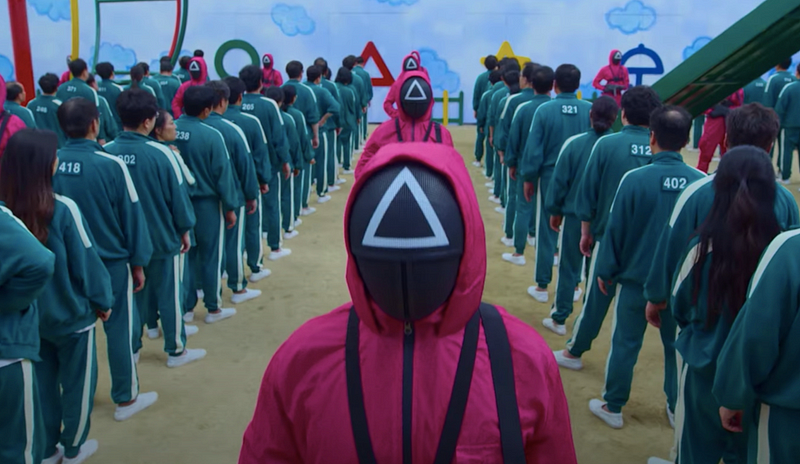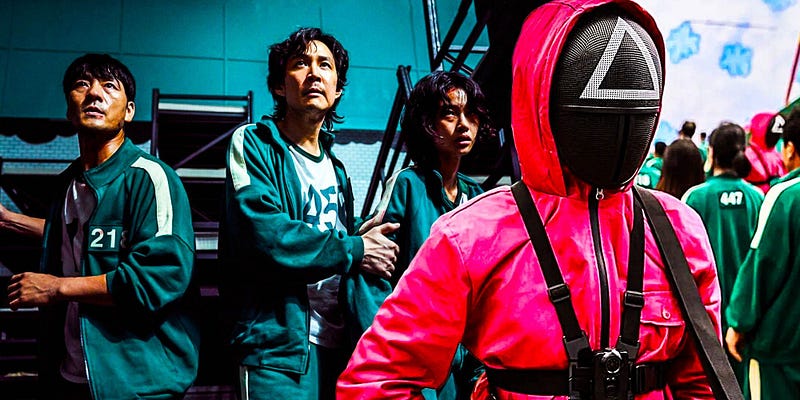
Squid Game
players and referees readying themselves for the next challenge. Photo courtesy of Netflix.
Warning: major spoilers for the show below.
By now, the question is not “have you watched
Squid Game
,” but “how have you not watched
Squid Game
yet.” As well as the memes on Instagram and TikTok, the show is also kicking off an international trend for Dalgona (a Korean toffee sweet that the
Squid Game
characters must use to solve a riddle). YouTubers have been uploading their reactions to every episode, yet there is little talk about the show’s content and themes. One might hear that
Squid Game
is one of the most disturbing shows in recent memory, or that it is a traumatic but gripping show. These statements are not incorrect, but if you ask someone about the themes of the show or what cultural contexts influenced
Squid Game’s
creation, not many people will reply with concrete answers.
Squid Game
is not a perfect masterpiece, but it is still a worthwhile watch for its important Korean themes and cultural contexts.
Squid Game
is a Korean fictional survival series, where 456 people play popular children’s games for a chance to win an exorbitant amount of money: ₩45.6 billion (38.7 million USD). The show focuses on several competitors who come from many different backgrounds and communities. The protagonist, Seong Gi-hun, is a gambling addict hounded by loan sharks who attempts to financially support his daughter by being a chauffeur. Ali Abdul is a factory worker from Pakistan who plays the Game when his boss refuses to pay him for months, intending to win the money for his wife and son. Kang Sae-byeok is a pickpocket who wants her family in North Korea to cross the 38th parallel (the border between North and South Korea) safely. These characters could not feel more different in personality, yet they share one common trait: financial instability. All of the players need the prize, and thus compete out of desperation instead of ego. For them, this could be the one chance to continue living, so when mysterious agents invite them to play the Game for money, they all jump to the occasion.
However, the agents do not tell players that if they fail to pass the challenges in this Game, they get disqualified by losing their lives. For example, when players accidentally get caught moving in a move-and-freeze children’s game, they get killed on the spot by a giant doll that dictates when the players should stop in the game. Cutting out stars and hearts from Dalgona, an innocent Korean childhood pastime, turns deadly when some of the players start incorrectly cutting out their shapes. Even the very title of the show,
Squid Game
, is a twisted play upon the children’s game of the same name, where two teams attack each other in a squid-like formation.
Squid Game
does not hesitate to reveal its villains as rich old men, who either orchestrate the Game or spectate at how the destitute workers rip each other apart for the prize money. Some of them even crack nauseating jokes about the players’ desperation, and others attempt to assault them for amusement. Simultaneously, the show also depicts the Game’s referees as its antagonists. While they are neither the rich developers nor the guests,
Squid Game
makes sure that its viewers realize that the referees are people who tolerate and exert violence against the players for profit, best exemplified in a sickening reveal in the fourth episode. The show thus critiques the rich and the bourgeoisie for having no respect or decency for the destitute, the poor and the needy. Since the pain and suffering of the players benefit them, they do not care for them, or even see the players as human.
It is not a stretch to say that the show is a biting commentary of capitalism and worker abuse. Hwang Dong-hyuk developed the original script of the show in 2008, a time of financial crisis for himself and many others around the world, and its influence is clear in
Squid Game’s
gruesome allegory of capitalism (Gi-hun’s character was even inspired by the organizers of the 2009 SsangYong Motor labor strike). Including children’s games in
Squid Game
is also no coincidence. Hwang added them to critique how capitalism adds excessive competition to many innocent subjects and activities. However, Hwang suspended his work on
Squid Game
until 2020, when he saw how the COVID-19 pandemic widened the economic gap between social classes in Korea, and how the workers and poor people in the country suffered. Seeing how
Squid Game
felt increasingly relevant despite over a decade since its conception, Hwang dedicated himself to completing the show, and
Squid Game
premiered on Netflix on Sept. 17 to thousands of viewers. Yet, there has been recent speculation over how
Squid Game’s
Netflix translations butcher the original Korean dialogue and how some claim that they obscure certain characters’ personalities and anti-capitalist sentiments. As a Korean person who watched the show, I can confirm only this: the subtitles that Netflix presents often convey radically different meanings than what the characters actually say.
Squid Game
is a bloody and heartbreaking tale of a game that relies on the sadism of the rich and the suffering of the poor and the workers, not unlike capitalism itself. Make no mistake, this is not a television show that exists for idle entertainment; it is a show with subject matter that demands to be seen and talked about.

Photo courtesy of Netflix.